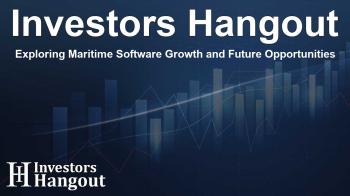Exploring Maritime Software Growth and Future Opportunities

Global Maritime Software Market Overview
The maritime software market is on a significant rise as technological advancements shape the future of shipping and logistics. With a valuation of USD 1,859 million recently, the market is expected to grow to USD 3,083 million in the coming years. This growth, achieving a compound annual growth rate (CAGR) of 7.6%, reflects an increasing reliance on digital solutions across the shipping industry.
Factors Promoting Market Expansion
As the world engages in more global trade, the demand for effective maritime software intensifies. The intricacies of maritime logistics require enhanced software solutions, promoting operational efficiency, regulatory compliance, and better cargo visibility. Cloud computing, artificial intelligence (AI), and analytics are cornerstones reshaping how businesses operate. From fleet management to environmental tracking, the adoption of maritime software technology is proving invaluable for stakeholders aiming for excellence and resilience.
Significant Trends Steering Development
One key aspect driving the maritime software sector is the shift towards onshore operations. The efficiency of managing vessel traffic, cargo handling, and customs processes is becoming pivotal amidst increased global trade activity. As companies strive for sophisticated management, software integration facilitates automation, real-time scheduling, and predictive maintenance, ultimately resulting in improved resource allocation and reduced turnaround times.
Cloud-Based Solutions Leading the Charge
The introduction of cloud-based maritime software is a primary contributor to market growth. These solutions offer flexibility and scalability essential for managing shipping data. Remote access capabilities facilitate operations across international fleets, minimizing costs while enhancing cybersecurity and software maintenance. Companies adopting cloud services see notable improvements in operational visibility, supporting dynamic scaling based on cargo demands and vessel capacities.
On-Premise Solutions in Demand
Despite the rapid ascent of cloud-based platforms, on-premise maritime software maintains its importance within the industry. Companies valuing data security and reliability continue using these systems, particularly for sensitive operations where internet connectivity might be an issue. On-premise solutions allow for customizable integration with legacy systems and maintain compliance with local data regulations, especially in regions with strict data sovereignty laws.
Real-Time Monitoring Enhancing Fleet Management
To further elevate the value of maritime software, real-time monitoring capabilities are increasingly crucial. Fleet management tools provide comprehensive insights into vessel conditions and operational metrics. By improving visibility across various geographies, these capabilities empower companies to make informed, data-driven decisions that positively impact operational efficiency and minimize costs.
Navigating Regulatory Challenges
Compliance with evolving international maritime regulations adds another layer of complexity that maritime software addresses effectively. By automating documentation processes and optimizing maintenance schedules to align with safety protocols, software solutions help shipping organizations adhere to essential standards. As regulations on emissions and safety become more stringent, relying on digital tools for management remains a key strategy for maintaining credibility and operational integrity.
Strategic Adaptations to Market Trends
The landscape of maritime operations is also changing with new trade routes and growing international collaborations. As shipping alliances proliferate, companies require robust, scalable software solutions capable of tackling increased traffic and enhancing data-sharing protocols. Advanced maritime software platforms, designed for interoperability and resource optimization, are becoming essential tools for successful navigation through these evolving market dynamics.
Investment in Smart Port Technologies
Modern ports are under significant pressure to enhance efficiency amid rising congestion. The adoption of maritime software plays a critical role in this transformation. With automation in crane management and intelligent traffic control, ports can streamline operations and reduce costs. As ports embrace technology, the demand for software solutions facilitating seamless intermodal operations grows, driving further investments and modernization strategies.
Integration with Broader Business Systems
The evolution of maritime software includes its integration with other enterprise systems such as ERP and global supply chain management. This synergy ensures companies can manage procurement, invoicing, and inventory within unified platforms. By minimizing administrative burdens and enhancing visibility, businesses are realizing the immense potential of fully integrated software ecosystems, further supporting the expansion of the maritime software market.
Frequently Asked Questions
What is driving the growth of the maritime software market?
The maritime software market is driven by global trade expansion, automation, digital transformation, and the need for real-time data and regulatory compliance.
How are cloud-based solutions impacting the maritime sector?
Cloud-based solutions provide scalable and flexible real-time access to shipping data, enhancing operational efficiency, reducing costs, and improving cybersecurity.
Do on-premise solutions still hold relevance?
Yes, on-premise solutions are vital for companies needing data security and reliable performance, especially in environments with limited internet access.
What role does regulatory compliance play in maritime software?
Maritime software helps companies comply with international regulations by automating documentation and monitoring emissions to avoid penalties associated with non-compliance.
How is technology enhancing port management?
Technology facilitates automation in ports, improving cargo handling efficiency and reducing congestion through better workflow management and scheduling.
About The Author
Contact Logan Wright privately here. Or send an email with ATTN: Logan Wright as the subject to contact@investorshangout.com.
About Investors Hangout
Investors Hangout is a leading online stock forum for financial discussion and learning, offering a wide range of free tools and resources. It draws in traders of all levels, who exchange market knowledge, investigate trading tactics, and keep an eye on industry developments in real time. Featuring financial articles, stock message boards, quotes, charts, company profiles, and live news updates. Through cooperative learning and a wealth of informational resources, it helps users from novices creating their first portfolios to experts honing their techniques. Join Investors Hangout today: https://investorshangout.com/
The content of this article is based on factual, publicly available information and does not represent legal, financial, or investment advice. Investors Hangout does not offer financial advice, and the author is not a licensed financial advisor. Consult a qualified advisor before making any financial or investment decisions based on this article. This article should not be considered advice to purchase, sell, or hold any securities or other investments. If any of the material provided here is inaccurate, please contact us for corrections.

